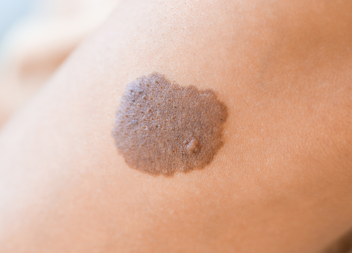What Are Skin Cancer Claims?
With over 16,000 diagnoses being made each year, skin cancer is the fifth most common cancer in the UK. Primarily caused by overexposure to ultraviolet light, skin cancer starts as abnormal clusters of skin cells in the outermost skin layer, known as the epidermis. Left untreated, these clusters can rapidly multiply, leading to malignant tumours. For this reason, it is crucial that skin cancer is diagnosed as early as possible to minimise the spread of the disease.
Skin cancer claims are typically made when patients were diagnosed late or initially misdiagnosed with a different disease, the delay in their treatment allowing their cancer to spread while reducing their chances of recovery. Depending on the length of the delay, skin cancer can worsen to the stage where attempts at surgery are significantly complicated, leaving severe scarring that could have otherwise been avoided.
Whether your skin cancer worsened due to delays or negligent surgical practices left you with unnecessary scarring or emotional trauma, you may be eligible to make a skin cancer compensation claim. At Medical Solicitors, we recognise the strict duty of care that medical professionals have to their patients and consider every account of negligence with the utmost sincerity. We urge you to speak with one of our skin cancer claims solicitors if you have any concerns about your diagnosis, treatment or aftercare.
What Types of Skin Cancer Claims Are There?
While there are many different types of skin cancer claims, which are tailored to each variation of the disease and the negligence that occurred during its treatment, they can be broadly categorised as either non-melanoma or melanoma skin cancer claims.
Non-melanoma skin cancer presents as a lump or discoloured patch on the skin that persists over a few weeks and then slowly progresses over months or years. Cancerous lumps tend to be red and firm, whereas cancerous patches are usually flat and scaly. The most common types of non-melanoma skin cancer claims are made in relation to the following two variants:
- Basal cell carcinoma – Commonly referred to as rodent ulcers, this variant starts in the cells lining the bottom of the epidermis. It can appear as a small shiny pink or pearly white translucent lump or a red scaly patch. Sometimes, there may be some brown or black pigment within the patch. With time, the lump gets slowly bigger and may become crusty, bleed or develop into a painless ulcer.
- Squamous cell carcinoma – This variant starts in the cells lining the top of the epidermis. It can form as a firm, pink lump with a rough, crusty surface. There can sometimes be a lot of surface scale or even a spiky horn sticking up from the surface. It often feels tender to the touch, easily bleeds and may develop into an ulcer.
Melanoma skin cancer presents as a new mole or change to an existing mole and can happen anywhere on the body. The most common area tends to be the back in men and the legs in women. They tend to be irregular in shape and are more than one colour. The moles may be itchy, bleed and change shape, size or colour.
Skin cancer claims for melanoma are typically made in relation to one of the following five variants:
- Superficial Spreading Melanoma – This is the most common type of melanoma in the UK. It tends to affect people with pale skin and freckles and is less common in people with darker skin.
- Nodular Melanoma – This form of melanoma can grow rapidly, penetrating into the deeper layers of skin when they are not removed. They usually appear as a lump on the skin that is either black or red in colour, and they are usually found on the head and neck or chest and back.
- Lentigo Malignant Melanoma – This melanoma typically affects older people who have experienced a higher amount of sun exposure. The moles develop slowly over several years, initially appearing similar to a freckle, then gradually becoming bigger and changing shape.
- Acral Lentiginous Melanoma – This is a rare type of melanoma which usually grows on the palms of the hands and soles of the feet. They can sometimes develop around a nail, most commonly the thumbnail or big toenail. They are most commonly found in people with dark skin but can happen in people with any skin colour.
- Amelanotic melanoma – These have little or no colour but may occasionally be red or pink and have light brown or grey edges.
When your skin cancer has been identified by a specialist, they will “stage” your cancer depending on how deep the cancer has grown into your skin and how far it has spread. These stages include:
- Stage 0 – Often referred to as ‘melanoma in situ,’ this stage describes when the melanoma is contained within the top layer of skin
- Stage 1 – This is an early-stage melanoma when the cancer is only in the skin and there are no signs of spread to lymph nodes or other parts of the body.
- Stage 2 – At this stage, the cancer is still only in the skin, and there is no sign of spread to the lymph nodes or other parts of the body.
- Stage 3 – This stage describes when melanoma has spread to nearby lymph nodes or it has spread to an area of the body between the melanoma and the lymph nodes.
- Stage 4 – At this stage, the melanoma has spread to other parts of the body away from the primary site of cancer and the nearby lymph nodes.
Whatever stage your skin cancer is caught, your case should be escalated and dealt with in accordance with the service standards outlined by the British Association of Dermatologists. Whether your referral to the appropriate specialist was delayed, your skin cancer was misdiagnosed at any stage in your treatment, or your specialists failed to meet the expected surgical standards, you could have grounds for a skin cancer compensation claim.
When Can I Make a Skin Cancer Claim?
From your first point of contact with your GP or consultant specialist to the surgical procedure and your post-operative care, medical negligence can occur at any stage in your skin cancer treatment. When you initiate the skin cancer claims process with Medical Solicitors, our specialist team will ask you to consider whether you experienced any of the following negligent scenarios:
- At your initial consultation, your GP did not properly examine your skin for signs of skin cancer.
- Subsequent to your GP appointment, no referral was made to dermatology or plastic surgery for further review.
- You were not seen for more than two weeks following your referral for squamous cell skin cancer, or your suspected basal cell carcinoma referral was delayed for more than 18 weeks.
- Following your specialist appointment, your consultant failed to arrange for biopsies to be taken, your biopsy was delayed, or your samples were misplaced or destroyed due to clerical error.
- When discussing your options for surgery, you were not made aware of the risks involved in your chosen treatment, making it impossible for you to give your fully informed consent.
- Delays in your diagnosis meant you were forced to undergo a more severe form of surgery.
- You were left with avoidable scarring or infections due to substandard surgical practices.
- Following your treatment, your skin cancer was not regularly reviewed, resulting in new tumours forming on your skin.
- You were misdiagnosed with skin cancer, resulting in unnecessary treatment, absence from work and emotional trauma.
What Is the Skin Cancer Claims Process?
Much like any claim for medical negligence compensation, skin cancer claims must be made within three years of receiving or realising you have received negligent treatment. While there are some mitigating circumstances in which you may be able to submit a Section 33 of the Limitation Act 1980 application to waive this time limit, in most cases, courts will “time bar” any claim made after three years.
For this reason, we recommend that you contact our specialist skin cancer claims solicitors as soon as you suspect you or someone you love has been subject to negligence. Once a solicitor has been assigned to your case, they will discuss your cancer treatment at length to ascertain which of the aforementioned acts of negligence you have been subject to, as well as any other suffering or losses you have incurred.
For our solicitors to calculate the amount of compensation you are owed, they will need to collect evidence of your negligence to inform and eventually support your skin cancer claim. This evidence could include:
- Medical records: From clinical notes taken during your early appointments to reports from your surgery and discharge from the hospital, your medical records will offer a clear insight into how your treatment was handled. Any instances of delay, oversight or lapses in judgment on the part of any medical practitioners should be apparent from your record and will be invaluable in securing your skin cancer claim compensation.
- Photographic evidence: If your surgery resulted in any physical damage to your skin, photographs taken before and after your treatment can offer a clear illustration of negligent surgical practices.
- Independent medical opinion: At Medical Solicitors, we work closely with third-party medical experts to assess the standard of care you received, compared with the expected standard of medical professionals working within dermatology or plastic surgery.
- Financial losses: Receiving a skin cancer misdiagnosis can impact your financial well-being as much as your physical and mental health. Whether you had to take time off for appointments and procedures, or you lost your job and are struggling to find new employment, financial losses subject to your treatment could contribute to your skin cancer compensation claim.
Once your evidence has been collected and your compensation has been calculated, our solicitors will submit your skin cancer claim and await a response. Throughout the process, we will regularly update you on the progress of your claim such that you are never left in any doubt.
Can Medical Solicitors Assist with My Skin Cancer Claim?
At Medical Solicitors, our team of medico-legal experts have over 30 years of experience handling skin cancer claims and other cancer cases. Their insight into the intricacies of making these claims has enabled them to win substantial sums of money for our previous clients, as well as enforce changes in medical practices to prevent the same mistakes from happening to more patients. Please refer to our skin cancer case studies for evidence of our previous successes.
Depending on how your skin cancer misdiagnosis has impacted your ability to work, we appreciate that you may be reluctant to pursue an expensive legal claim. At Medical Solicitors, we believe all wronged patients should have a right to legal representation, which is why we operate a ‘No Win, No Fee’ policy for all cancer patients who have suffered at the hands of negligent practitioners.
If you or someone you know has been subject to negligence during their treatment, please get in touch with us today so that we can start working on your skin cancer claim as soon as possible.












